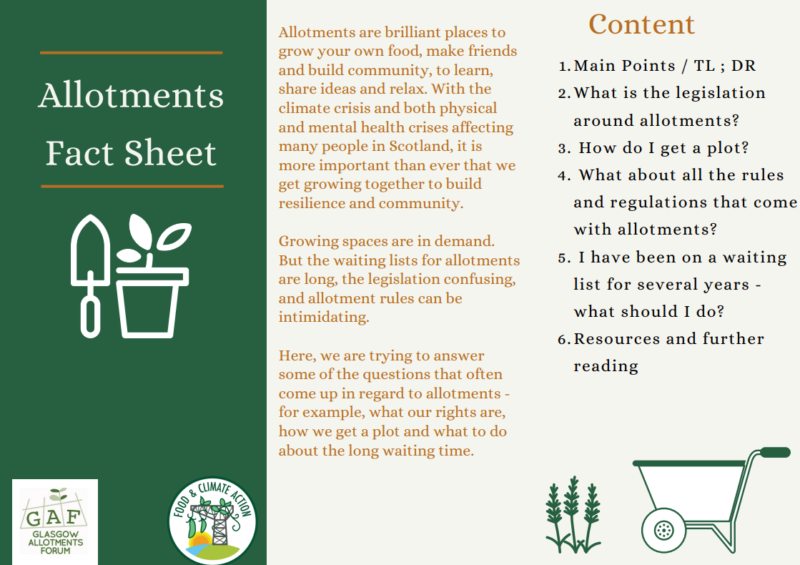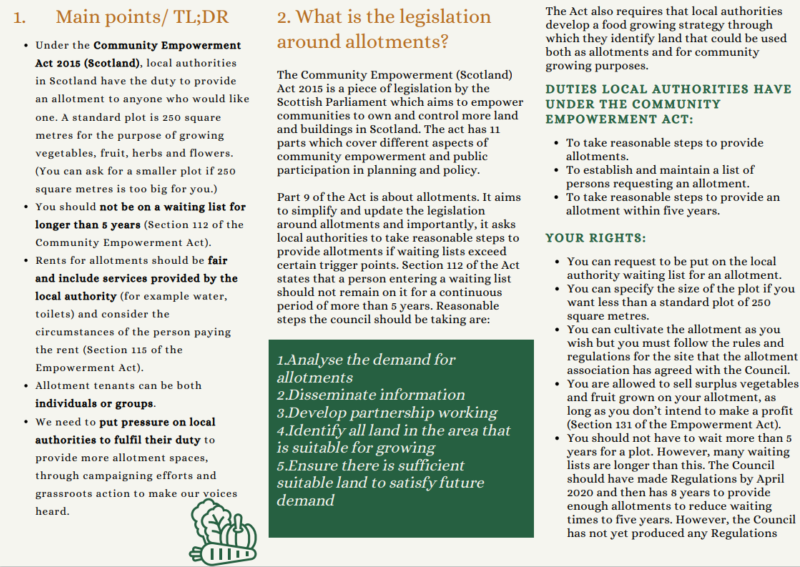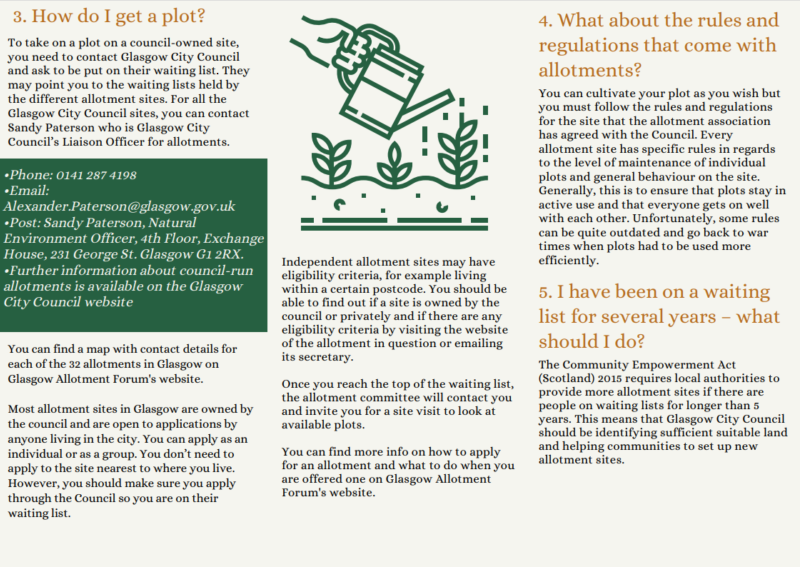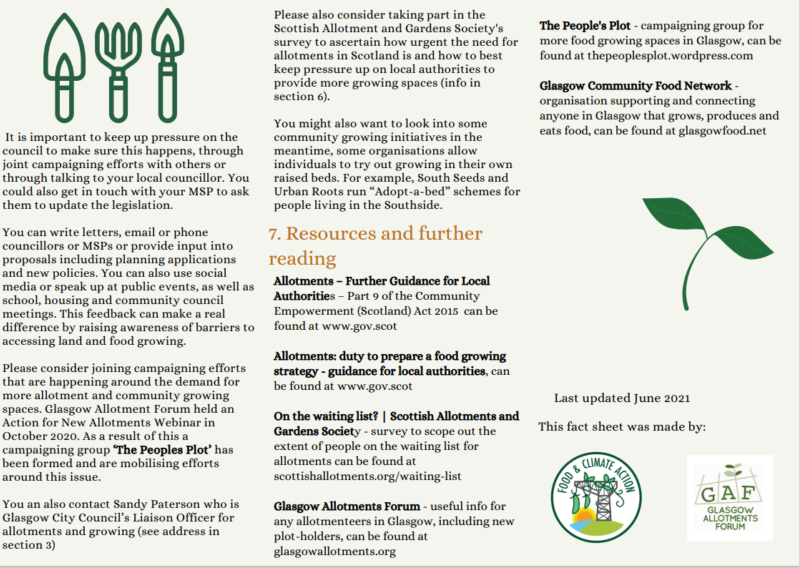Resources on this page:
- Demand for Land Campaign Pack
- Glasgow Allotments Info Booklet
- Fringe Farming in Glasgow Report
- Women in Agroecological Farming Booklet
- Resources from other organisations

Demand for Land Campaign
The Food and Climate Action project are pleased to share with you the results of our Demand for Land campaign. Rounding off a year of activity since COP26 highlighting the need for more accessible land for growing in Glasgow, the pack includes:
- Groundwork: A Market Gardener’s Toolkit (made in partnership with Propagate)
- Route maps to acquiring land in Glasgow (a longer, more detailed version and a visual one page summary)
- An engagement case study of our 'Show What You Grow' competition (with a campaign postcard template)
- The results of our Demand for Land survey and;
- Inspirational Land Illustrations to show how underused sites can be used for growing, available as free-to-use images and videos.
The pack has 3 intended audiences: decision-makers; community groups and businesses working in food growing and; individuals with an appetite for gardening. So, whatever reason has brought you here, we're sure you'll find something for you.
The purpose of the campaign was to inspire the people of Glasgow to think about our city’s land differently, seeing the possibilities that so much of it has for food production; as well as to look at the barriers to accessing land and where changes could help lessen those obstacles. The resulting pack is free for all to access and has been built upon, and in response to, feedback from numerous participants who were engaged in conversations, competitions and events throughout the Campaign. The project hopes that by making the processes for acquiring and working land in Glasgow clearer, and by sharing positive stories of communities coming together over food, more people will become involved in growing. We hope that these tools are useful for you in a variety of ways from beginning to grow your own veg, to engaging in conversations with your community about land rights to changing policy to make it easier for Glasgow to have a more sustainable food system. For more info, please contact [email protected]
Credits:
With thanks to: Emily Chappell for the design of our Land Illustrations; Emily Tough for the illustrations on 'Groundwork: A Market Gardener's Toolkit' and illustrations and design on the Route Map resources; Good Food For Glasgow who kindly let us use their collages as part of the exhibition at Kinning Park Complex, which feature in our header image; all our Food and Climate Action project partners (Glasgow Eco Trust, Central and West Integration Network, St. Paul's Youth Forum, The Space and Urban Roots); our funders; Glasgow Allotments Forum, Community Land Scotland and Propagate for their invaluable advice and guidance and to everyone who got involved in our workshops, events and consultations.

Allotments in Glasgow
GCFN is working closely with Glasgow Allotments Forum to campaign for the creation of more allotment spaces and shorter waiting times in Glasgow. In the summer of 2021, GAF and the Food & Climate Action project came together to create this booklet with information on the legislation and campaigning efforts around allotments in Glasgow.
Fringe Farming Project
As part of the UK-wide Fringe Farming project, Sustain has worked with Glasgow Community Food Network (GCFN) and Shared Assets in 2021 to explore and understand the barriers and opportunities for agroecological peri-urban farming in the Glasgow area through desk research and action planning with stakeholders. This briefing summarises key findings and recommendations including a collaborative action plan to take these forward. The recommendations build on elements of the Glasgow City Food Plan related to peri-urban farming.
The briefing sets out a strong business case for enabling ‘fringe farming’ to expand in the area, to become a mainstay of a sustainable, just, localised food economy, providing good jobs, education and training, better access to nature, and high quality, affordable food for all, contributing to greater resilience of the city region.
The document also provides information on the current picture of agroecology in the Glasgow region, existing regional governance commitments, and case studies from Glasgow and elsewhere as sources of inspiration for future mobilisations.
Findings from this briefing focused on the Glasgow region will feed into a collaborative process, that includes action research in Bristol, London and Sheffield, to generate best practice and policy recommendations for agroecological peri-urban farming across the UK.
Key recommendations for Glasgow City Council-led actions include:
- Creation of an open access map of land spaces in Glasgow with relevant ownership and associated suitability for food growing (this to include public and private land, and re-establishing food growing areas in local parks).
- Land available being prioritised for food growing rather than lawns or feed crops.
- Clarification, simplification and transparency of decision-making processes within the council, especially with regards to procurement processes, and decisions on making land available.
- More support for food growing, both financial and human resource within the council, and this to have a long-term approach to support new growing spaces until they are able to become independent.
- Support grower and procurer events to build relationships towards service contracts integrating locally-grown food into the public sector– with a view to support a pilot procurement project with a school and GCFN.
Read the full report here:
- Peri-urban land in Glasgow: The potential for food growing and farming made in partnership with Fringe Farming, Glasgow Community Food Network, Shared Assets and Sustain

Women in Agroecological Farming
In 2021 and 2022, Food and Climate Action supported a 24-week course in agroecological farming, funded by Solace Women's Aid Empowering Women fund delivered in partnership with Central and West Integration Network.
15 women joined in a transformational programme consisting of a series of weekly tasters in urban agroecology, including market gardening, chicken farming, herbalism, beekeeping, soap making, social enterprise and more.
One women said “Visiting different farms was an eye opener to have an idea of crops grown and livestock reared.” Several of the women were refugees from various countries, and said “This group has given me a drive to want to do more around food growing for our BAME communities.”
Jenny worked with CWIN, the women in the group, Project Coordinator and Photographer Clementine Sandison and artists Josie Vallely and Alkmini Gkousiari to produce the booklet 'Sow a Seed, Grow a World' to capture their learnings. Take a look below.
Resources from other Organisations
- Southseeds Croft - The Croft is a beautiful space sheltered by mature trees where South Seeds runs an adopt-a-raised-bed scheme from early April to early November every year. South Seeds set up the Croft in 2015, on the disused courts of Queen’s Park Bowling and Tennis Club, beside Queen’s Park recreation ground. In this booklet you can meet several of 2017’s crofters, find out some of the many benefits they got from the experience, and how they plan to continue growing away from the Croft by using the skills, knowledge and confidence they picked up over the growing season. Booklet Of Croft Case Studies
- Our Place Place Standard Tool Final Version Print Interactive And Booklet Details Oct 22 - The Place Standard is a simple tool to structure a conversation about a place. It helps people to think about both the physical and social aspects of places, and the important relationship between them. It has 14 themes, each with a main question and further prompts to support conversations, inform the assessment and identify issues for improvement. Place Standard Tool Website
- Glasgow City Council's Growing Spaces Map: a map that contains existing GCC allotment sites and potential new growing sites











